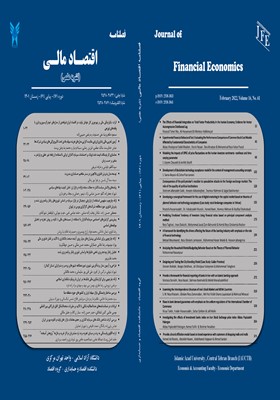ارائه چارچوبی برای گزارشگری مالی بانکها در ایران با رویکرد بانکداری اسلامی
محورهای موضوعی : اقتصاد مالیمرتضی درویشی 1 , رضا نظری 2 * , بهمن بنی مهد 3 , مهدی مرادزاده فرد 4
1 - گروه حسابداری، واحد کرج، دانشگاه آزاد اسلامی، کرج، ایران
2 - گروه حسابداری، واحدکرج، دانشگاه آزاد اسلامی، کرج، ایران
3 - گروه حسابداری، واحدکرج، دانشگاه آزاد اسلامی، کرج، ایران
4 - گروه حسابداری، واحدکرج، دانشگاه آزاد اسلامی، کرج، ایران
کلید واژه: کیفیت گزارشگری, واژههای کلیدی: چارچوب گزارشگری مالی بانکها در ایران, نظریهپردازی زمینه بنیان,
چکیده مقاله :
چکیدهبه منظور ارائه چارچوبی برای گزارشگری مالی بانکها در ایران با نظر به ویژگیهای حاکم بر سیستم بانکی از روش پژوهش کیفی و رویکرد مبتنی بر نظریهپردازی زمینه بنیان استفاده شد. در ابتدا با اخذ نظرات خبرگان حرفه حسابداری و حسابرسی به بررسی عوامل تأثیرگذار بر کیفیت گزارشگری در سیستم بانکی ایران پرداخته شد. در ادامه مدلی شامل شرایط علّی، عوامل مداخلهگر و راهبردهای مربوط به کیفیت گزارشگری و پیامدهای آن ارائه گردید. اصلاح ساختار عملیات نظام بانکی، اصلاح ساختار نظارتی بانک مرکزی، آموزش کارکنان، ایجاد ابزارهای اسلامی جدید، اعمال نظارت شرعی، اصلاح قانون عملیات بانکی بدون ربا، ایجاد ابزارهای سیاست پولی منطبق با شریعت و پیادهسازی ضوابط فقهی بهعنوان مهمترین متغیرهای زمینهساز و عادت، نظریات متفاوت فقها، سفتهبازی، صوری بودن فعالیتها، ضعفهای قانونی، ضعف در نظارت شرعی، هزینه بر بودن، مقولة ربا، تفارق قلمرو مباحث دینی با مباحث علمی و تعارض میان نظریههای اقتصاد اسلامی و نظریههای متعارف اقتصادی بهعنوان مهمترین متغیرهای بازدارنده شناخته شد. همچنین بهترین روش برای ارائه بهینة حقوق صاحبان سپرده، دستهبندی سپردهگذاران در طبقهای جداگانه همانند حقوق صاحبان سهام تشخیص داده شد و بهمنظور تحقق عدالت و دستیابی سپردهگذاران به حقوق حقه، تبعیت این طبقه از تئوری مالکیت عنوان شد. نتایج معنیداری در پیادهسازی گزارشگری مالی بانکها در ایران با رویکرد بانکداری اسلامی به دست آمدکه در صورت پیاده سازی مراتب منجر به بهبود عدالت، توزیع مناسب ثروت، بهبود عملکرد، امنیت شغلی، رعایت شرع، ساختار مناسب نظام بانکی، توسعه پایدار اقتصادی و در نهایت اخلاق اسلامی خواهد شد.
AbstractObjective: The purpose of this study is to provide a framework for financial reporting of banks in Iran according to the characteristics of the banking system.Methods: in this research, the qualitative research method and the approach based on Grounded theory have been used. First, by obtaining the opinions of accounting and auditing experts, related managers in the Auditing Organization, the factors affecting the quality of reporting in the Iranian banking system are examined. Finally, a model including causal conditions, intervening factors and context, as well as strategies related to quality, reporting and its consequences are presented.Results: According to the results of the research, reforming the operating structure of the banking system, reforming the supervisory structure of the central bank, training staff, creating new Islamic tools, applying sharia supervision, amending the law on interest-free banking, creating monetary policy tools in accordance with Sharia and implementing jurisprudential criteria as the most important Background variables and habit, different theories of jurists, speculation, formalities of activities, legal weaknesses, weakness in religious supervision, costly ness, the category of usury, the separation of the realm of religious issues with scientific issues and the conflict between theories of Islamic economics and conventional economic theories. Were identified as the most important inhibitory variables.Conclusion: the implementation of financial reporting of banks in Iran with the approach of Islamic banking, leads to justice, proper distribution of wealth, performance improvement, job security, compliance with Sharia, proper structure of the banking system, sustainable economic development and finally Islamic ethics.
فهرست منابع
_||_

